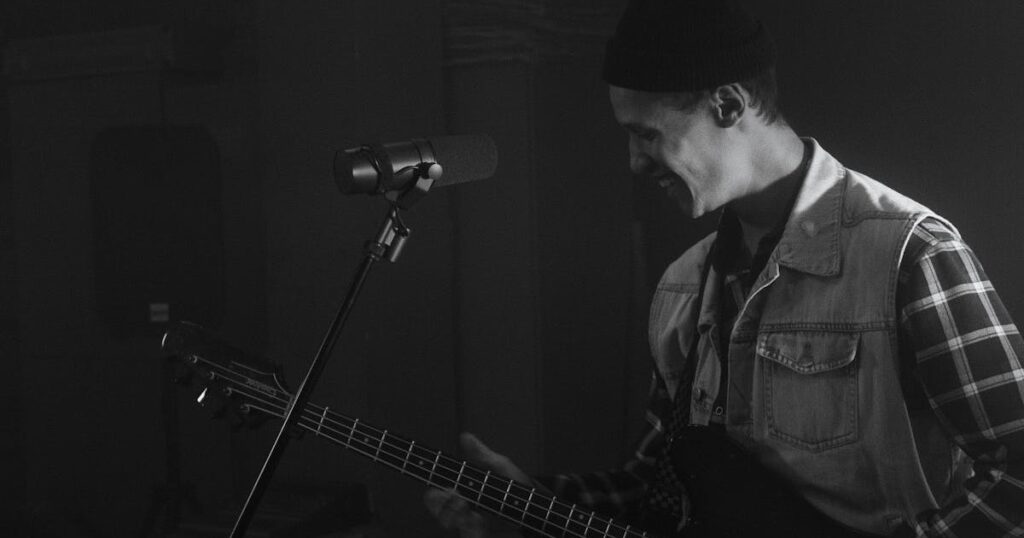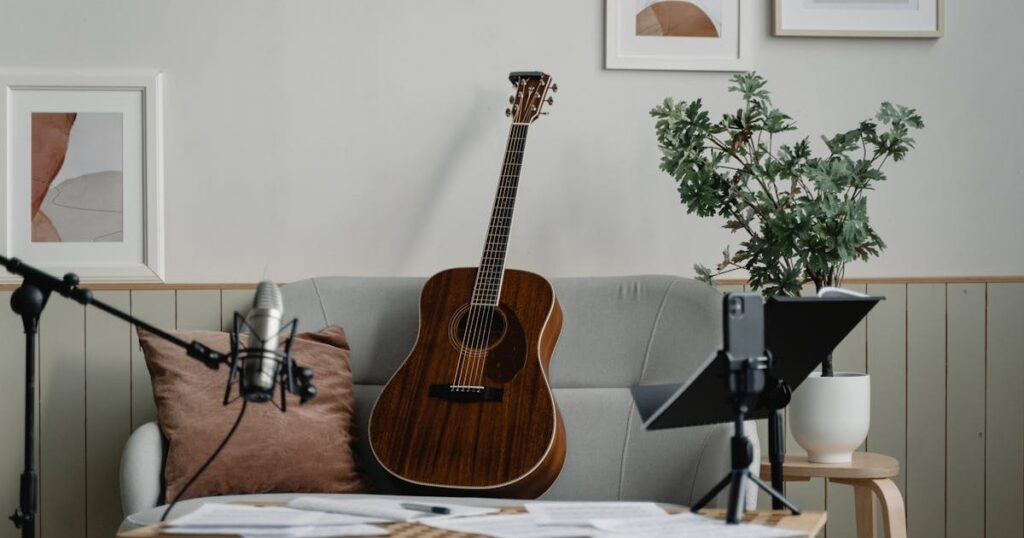Key takeaway: Choosing the right microphone for an acoustic guitar is crucial for achieving optimal sound quality. Each model offers unique benefits, from clarity and sensitivity to versatility and build quality. Understanding these options will help you make an informed decision tailored to your needs.
Are you in the market for a microphone that can capture the crisp and rich sound of your acoustic guitar? Look no further, because we have compiled a list of top picks that will surely elevate your music to new heights. Whether you’re a professional musician, hobbyist or just starting out, having the right microphone is crucial in creating high-quality recordings.

In this article, we will discuss five microphones that are specifically designed for acoustic guitars. These microphones are highly recommended by experts and musicians alike, making them stand out from other options in the market. So without further ado, let’s dive into our top picks for a good mic for acoustic guitar.
Shure SM81
The Shure SM81 is a popular choice among musicians for its excellent sound quality and durability. It is a condenser microphone that can handle high sound pressure levels, making it perfect for recording loud instruments like the acoustic guitar. Its flat frequency response and low self-noise make it ideal for capturing the natural sound of your guitar without any added colouration.
One of the standout features of this microphone is its ability to switch between cardioid and omnidirectional polar patterns, allowing you to adjust the directionality based on your recording needs. It also comes with a built-in 10dB pad switch to handle louder sources, making it a versatile option for various recording situations. Overall, the Shure SM81 is a reliable and high-quality microphone that will surely satisfy your acoustic guitar recording needs.
Specifications:
- Frequency Response: 20Hz – 20kHz
- Polar Pattern: Cardioid/Omnidirectional
- Sensitivity: -45dBV/Pa (5.6mV)
- Impedance: 150Ω
Pros:
- Excellent sound quality
- Durable construction
- Versatile polar patterns and pad switch
Cons:
- Higher price point compared to other options on this list
Beyerdynamic M160
The Beyerdynamic M160 is a dynamic ribbon microphone that has been used in countless recordings since its release in the 1950s. Its unique double-ribbon design allows it to capture the sound of acoustic instruments with incredible detail and warmth.
This microphone also has a hypercardioid polar pattern, making it perfect for isolating your guitar’s sound while minimizing unwanted background noise. What sets this microphone apart is its ability to handle high sound pressure levels without distortion, making it a great option for recording loud guitars or even drums.

It also has a built-in shock mount to reduce handling noise, ensuring clean and clear recordings every time. The Beyerdynamic M160 may be an old-school mic, but its timeless sound and durability make it a top pick for recording acoustic guitars.
Specifications:
- Frequency Response: 40Hz – 18kHz
- Polar Pattern: Hypercardioid
- Sensitivity: -55dBV/Pa (1.8mV)
- Impedance: 200Ω
Pros:
- Warm and detailed sound reproduction
- Can handle high sound pressure levels without distortion
- Built-in shock mount to reduce handling noise
Cons:
- Requires phantom power to operate, and may not be compatible with all audio interfaces.
Neumann KM184 Stereo Set
The Neumann KM184 is another condenser microphone known for its exceptional sound quality and versatility. This stereo set comes with two microphones, allowing you to record in a stereo configuration for a more immersive sound.
Its compact size and cardioid polar pattern make it easy to position for recording acoustic guitars without picking up unwanted background noise. With its extended frequency response, the Neumann KM184 can capture every nuance of your guitar’s sound, from the low-end warmth to the sparkling highs.
It also has a high SPL handling capability and low self-noise, making it suitable for both studio recordings and live performances. The Neumann KM184 Stereo Set is an investment that will surely elevate your acoustic guitar recordings to professional-level quality.
Specifications:
- Frequency Response: 20Hz – 20kHz
- Polar Pattern: Cardioid
- Sensitivity: 15mV/Pa
- Impedance: 50Ω
Pros:
- High-quality sound reproduction in a stereo configuration
- Compact size and versatile polar pattern for easy positioning
- Low self-noise and high SPL handling capability make it suitable for various recording situations.
Cons:
- Higher price point compared to other options on this list.
AKG C451 B
The AKG C451 B is a small-diaphragm condenser microphone that has been used in countless recordings since its release in the late 1960s. Its clear and detailed sound reproduction makes it a popular choice among musicians and audio engineers for recording acoustic instruments.

This microphone also has a switchable high-pass filter to reduce low-frequency noise, making it ideal for capturing the natural sound of your guitar. One notable feature of the AKG C451 B is its ability to handle high sound pressure levels without distortion, thanks to its -10dB pad switch.
It also has a hypercardioid polar pattern, allowing for precise capturing of your guitar’s sound while minimizing background noise. Overall, the AKG C451 B is a reliable and versatile microphone that will surely impress with its exceptional sound quality.
Specifications:
- Frequency Response: 20Hz – 20kHz
- Polar Pattern: Hypercardioid
- Sensitivity: 9mV/Pa (-41dBV)
- Impedance: <200Ω
Pros:
- Clear and detailed sound reproduction
- Can handle high sound pressure levels without distortion
- Switchable high-pass filter to reduce low-frequency noise
Cons:
- It may require a shock mount for better handling noise reduction.
Audio-Technica AT4053B
The Audio-Technica AT4053B is a popular choice among musicians and audio professionals for its versatility, durability, and exceptional sound quality. This hypercardioid condenser microphone has a flat frequency response and low self-noise, making it perfect for capturing the natural sound of your acoustic guitar.
What sets this microphone apart is its interchangeable capsules, allowing you to switch between cardioid, omnidirectional, and hyper-cardioid polar patterns based on your recording needs. It also comes with a built-in high-pass filter to reduce low-frequency noise and a -10dB pad switch to handle louder sources.
The Audio-Technica AT4053B is a reliable and versatile option that will surely deliver excellent results in any recording situation.
Specifications:
- Frequency Response: 20Hz – 20kHz
- Polar Pattern: Hypercardioid (interchangeable capsules)
- Sensitivity: -34dBV/Pa (19.9mV)
- Impedance: 50Ω
Pros:
- Versatile with interchangeable capsules and switchable polar patterns and filters.
- Excellent sound quality with low self-noise.
- Durable construction for long-lasting use.
Cons:
- May have a learning curve when using different capsules and settings.
Frequently Asked Questions
Is it necessary to use a pop filter when recording?
While a pop filter is not strictly necessary, it is highly recommended. A pop filter helps to reduce plosive sounds caused by spoken or sung consonants such as “P” and “B,” ensuring a cleaner recording and protecting the microphone from moisture.
How important is microphone placement?
Microphone placement is crucial in determining the quality of the recording. Small adjustments in positioning can greatly affect the sound captured. Experimenting with distance and angle can help achieve the desired tonal quality and room ambience.
Do I need an audio interface for these microphones?
Yes, an audio interface is essential for connecting professional-grade microphones to your computer. It converts the microphone’s analogue signals into digital format for recording and often provides phantom power required by condenser microphones.
Can I use these microphones for live performances?
Many of the microphones listed, such as the Neumann KM184 and Audio-Technica AT4053B, are suitable for live performances due to their durability and sound quality. However, it’s important to consider factors such as the environment and amplification used for the performance.
Conclusion: good mic for acoustic guitar
When it comes to recording acoustic guitars, having the right microphone can make all the difference in capturing the natural sound and nuances of your instrument. While there are many options available on the market, these five microphones stand out for their exceptional sound quality, durability, and versatility.
Whether you’re looking for a traditional dynamic ribbon mic, a stereo set for immersive recordings, or a versatile condenser mic with interchangeable capsules, there is sure to be an option on this list that will suit your needs and elevate your acoustic guitar recordings to the next level.
